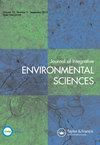Unlocking the interaction of social restriction and social protection in Indonesia’s COVID-19 policy: future risk and adaptation
IF 3.5
4区 环境科学与生态学
Q3 ENVIRONMENTAL SCIENCES
Journal of Integrative Environmental Sciences
Pub Date : 2023-10-15
DOI:10.1080/1943815x.2023.2269223
引用次数: 0
Abstract
The Indonesian government has issued hundreds of regulations and policies to deal with the impact of the COVID-19 pandemic. These various policies and regulations assess how a government responds, mitigates, and prevents systemic crises in its country. These decisions- and policy-making processes are largely determined by the country’s unique socioeconomic and political landscape. This paper reviewed 875 regulations issued by the Indonesian government at the national level in 2020–2022 to determine which policies have the most direct social, economic, and health impact on the Indonesian population. We highlight social protection to explore the challenges and opportunities to respond future risk by taking benefit from progressive effort of the Indonesian government to protect all Indonesian populations with the priority of the most vulnerable groups. This paper aims to map out government policies and regulations in handling the pandemic and exploring the potential opportunities for adaptation to respond future risk. The study is based on expert group discussion and policy mapping. As one of the findings of the investigation, this paper discusses the interaction between large-scale and micro-scale social restriction and social protection policies, which are considered the foremost solutions for handling Indonesia’s more severe economic crisis and facing current and future risks, including climate change impact. While social protection is one of the massive strategies to relieve economic impact to the most affected group, effectiveness and success are still challenges concerning data. This paper also provides important notes regarding climate change adaptation and how the government must respond to future risks.解开印尼COVID-19政策中社会限制和社会保护的相互作用:未来风险和适应
印尼政府发布了数百项法规和政策,以应对COVID-19大流行的影响。这些不同的政策和法规评估政府如何应对、减轻和防止该国的系统性危机。这些决策和决策过程在很大程度上取决于该国独特的社会经济和政治环境。本文回顾了印尼政府在2020-2022年国家层面发布的875项法规,以确定哪些政策对印尼人口具有最直接的社会、经济和健康影响。我们强调社会保护,以探索挑战和机遇,以应对未来的风险,利用印尼政府的进步努力,保护所有印尼人,优先考虑最弱势群体。本文旨在制定政府应对大流行的政策和法规,并探讨应对未来风险的潜在适应机会。该研究基于专家小组讨论和政策绘图。作为调查的结果之一,本文讨论了大规模和微观尺度的社会限制和社会保护政策之间的相互作用,这被认为是应对印度尼西亚更严重的经济危机和面临当前和未来风险的首要解决方案,包括气候变化的影响。虽然社会保护是减轻对最受影响群体的经济影响的大规模战略之一,但有效性和成功仍然是数据方面的挑战。本文还提供了关于气候变化适应以及政府必须如何应对未来风险的重要说明。
本文章由计算机程序翻译,如有差异,请以英文原文为准。
求助全文
约1分钟内获得全文
求助全文
来源期刊

Journal of Integrative Environmental Sciences
ENVIRONMENTAL SCIENCES-
CiteScore
3.90
自引率
0.00%
发文量
13
审稿时长
>12 weeks
期刊介绍:
Journal of Integrative Environmental Sciences (JIES) provides a stimulating, informative and critical forum for intellectual debate on significant environmental issues. It brings together perspectives from a wide range of disciplines and methodologies in both the social and natural sciences in an effort to develop integrative knowledge about the processes responsible for environmental change. The Journal is especially concerned with the relationships between science, society and policy and one of its key aims is to advance understanding of the theory and practice of sustainable development.
 求助内容:
求助内容: 应助结果提醒方式:
应助结果提醒方式:


